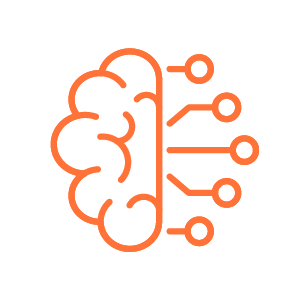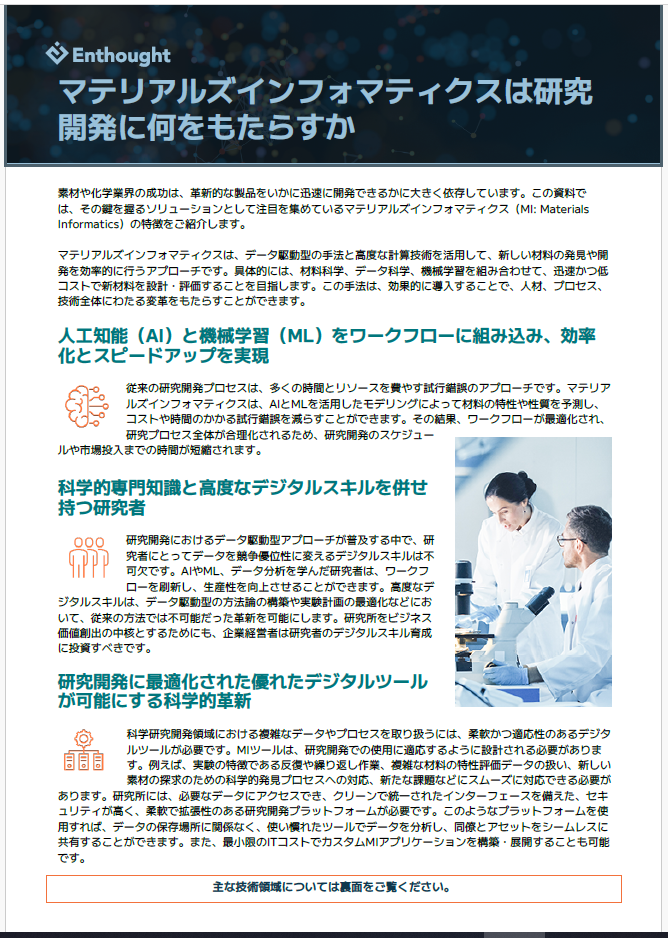今日の材料科学および化学業界における研究開発
素材や化学業界における成功は、これまで以上に革新的な製品をいかに短期間で開発できるかにかかっています。今日、マテリアルズインフォマティクスはそれを可能にし得るソリューションとして注目を浴びています。
マテリアルズインフォマティクス(MI)とは、データ駆動型戦略と高度な計算技術に基づいて材料発見と製品開発を進める最新のアプローチです。より迅速に、より安価に、より効率的に、新しい材料を開発するため、材料科学・データ科学・科学計算の要素を組み合わせています。
マテリアルズインフォマティクスは新たな技術やプラットフォームの導入ということだけではありません。MIを効果的に導入することで、人材、プロセス、そして技術に変革をもたらすのです。
このページでは、最新の研究開発におけるMIの特徴についてご紹介します。

人工知能(AI)と機械学習(ML)をワークフローに組み込み、効率化とスピードアップを実現
従来の研究開発プロセスは、多くの時間とリソースを費やす試行錯誤のアプローチです。マテリアルズインフォマティクスは、AIとMLを活用したモデリングによって材料の特性や性質を予測し、コストや時間のかかる試行錯誤を減らすことができます。その結果、ワークフローが最適化され、研究プロセス全体が合理化されるため、研究開発のスケジュールや市場投入までの時間が短縮されます。
![]()
科学的専門知識と高度なデジタルスキルを併せ持つ研究者
研究開発におけるデータ駆動型アプローチが普及する中で、研究者にとってデータを競争優位性に変えるデジタルスキルは不可欠です。AIやML、データ分析を学んだ研究者は、ワークフローを刷新し、生産性を向上させることができます。高度なデジタルスキルは、データ駆動型の方法論の構築や実験計画の最適化などにおいて、従来の方法では不可能だった革新を可能にします。研究所をビジネス価値創出の中核とするためにも、企業経営者は研究者のデジタルスキル育成に投資すべきです。
材料業界をリードする出光興産が、エンソート独自のマテリアルズインフォマティクス推進プログラムを採用して、どのように研究開発チームに革新をもたらしたかをご覧ください。

研究開発に最適化された優れたデジタルツールが可能にする科学的革新
科学研究開発領域における複雑なデータやプロセスを取り扱うには、柔軟かつ適応性のあるデジタルツールが必要です。MIツールは、研究開発での使用に適応するように設計される必要があります。例えば、実験の特徴である反復や繰り返し作業、複雑な材料の特性評価データの扱い、新しい素材の探求のための科学的発見プロセスへの対応、新たな課題などにスムーズに対応できる必要があります。研究所には、必要なデータにアクセスでき、クリーンで統一されたインターフェースを備えた、セキュリティが高く、柔軟で拡張性のある研究開発プラットフォームが必要です。このようなプラットフォームを使用すれば、データの保存場所に関係なく、使い慣れたツールでデータを分析し、同僚とアセットをシームレスに共有することができます。また、最小限のITコストでカスタムMIアプリケーションを構築・展開することも可能です。
研究開発や複雑な科学データ用に構築されたクラウドネイティブ・プラットフォーム、Enthought Edgeについてご覧ください。
Related Content
研究開発組織の変革を成功させるためのパートナー選び
現在の競争が激しいR&D環境において、適切なテクノロジーパートナーを選ぶことは、組織にとって最も重要な意思決定の1つです。理想的なパートナーとは、単なるツールベンダーやシステムインテグレーターではなく、生産性を向上させ、イノベーションを加速し、競争力を引き出す解決策を提供する科学的な専門知識と戦略的な洞察を兼ね備えた「変革の同志」です。
「AIスーパー・モデル」が材料研究開発を革新する
近年、計算能力と人工知能の進化により、材料科学や化学の研究・製品開発に変革がもたらされています。エンソートは常に最先端のツールを探求しており、研究開発の新たなステージに引き上げる可能性を持つマテリアルズインフォマティクス(MI)分野での新技術を注視しています。
デジタルトランスフォーメーション vs. デジタルエンハンスメント: 研究開発における技術イニシアティブのフレームワーク
生成AIの登場により、研究開発の方法が革新され、前例のない速さで新しい科学的発見が生まれる時代が到来しました。研究開発におけるデジタル技術の導入は、競争力を向上させることが証明されており、企業が従来のシステムやプロセスに固執することはリスクとなります。デジタルトランスフォーメーションは、科学主導の企業にとってもはや避けられない取り組みです。
産業用の材料と化学研究開発におけるLLMの活用
大規模言語モデル(LLM)は、すべての材料および化学研究開発組織の技術ソリューションセットに含むべき魅力的なツールであり、変革をもたらす可能性を秘めています。
科学研究開発における効率の重要性
今日、新しい発見や技術が生まれるスピードは驚くほど速くなっており、市場での独占期間が大幅に短縮されています。企業は互いに競争するだけでなく、時間との戦いにも直面しており、新しいイノベーションを最初に発見し、特許を取得し、市場に出すためにしのぎを削っています。
R&D イノベーションサミット2024「研究開発におけるAIの大規模活用に向けて – デジタル環境で勝ち残る研究開発組織への変革」開催レポート
去る2024年5月30日に、近年注目のAIの大規模活用をテーマに、エンソート主催のプライベートイベントがミッドタウン日比谷6FのBASE Qで開催されました。
科学研究開発における小規模データの最大活用
多くの伝統的なイノベーション主導の組織では、科学データは特定の短期的な研究質問に答えるために生成され、その後は知的財産を保護するためにアーカイブされます。しかし、将来的にデータを再利用して他の関連する質問に活用することにはあまり注意が払われません。
デジタルトランスフォーメーションの実践
デジタルトランスフォーメーションは、組織のデジタル成熟度を促進し、ビジネス価値を継続的に提供するプロセスです。真にビジネスを変革するためには、イノベーションを通じて新しい可能性を発見し、企業が「デジタルDNA」を育む必要があります。
科学研究開発リーダーが知っておくべき AI 概念トップ 10
近年のAIのダイナミックな環境で、R&Dリーダーや科学者が、企業の将来を見据えたデータ戦略をより効果的に開発し、画期的な発見に向けて先導していくためには、重要なAIの概念を理解することが不可欠です。
